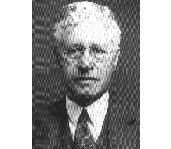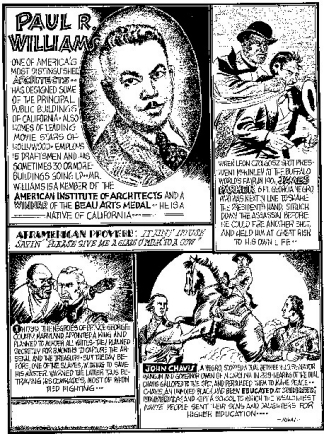 Volume XII Number 4
July, 1998 The
Wisdom Of The Ages
Educator and Race Leader
Volume XII Number 4
July, 1998 The
Wisdom Of The Ages
Educator and Race Leader

The life of John Hope, [the first black
president of Morehouse College and Atlanta University] can add much to
our knowledge and under- standing of the world of African Americans at
the beginning of the twentieth century. Although Hope’s problems were rooted
in systemic discrimination, they also reflected issues, desires, and expectations
that emanated from the African American community itself. Instead of an
external view of segregated black life, this work looks at that community
from the inside out. . . . I look at the peculiar nuances that went into
the making of a black leader who was also a black college president.
However, in contrast to what Harlan has argued regarding Washington, I
believe it was not power that motivated Hope (though he clearly was not
without power) but of obligation and commitment to perform two difficult
tasks equally well: developing black higher education and resolving other
“race problems” as he interpreted them.
This biography of John Hope also contributes
to our understanding of color, class, and caste within the African American
community, especially the group Willard Gatewood identified as “aristocrats
of color.” Born of a bi-racial union in Augusta, Georgia, shortly after
the Civil War, Hope belonged to a small black upper-class elite whose history
predated the coming of freedom. Though technically a mulatto, John Hope
looked like a white man with no visible traces of African blood.
Considering the perilous status of African
Americans during his lifetime, why, given the opportunity, did Hope not
pass for white? That question was raised by some whites while Hope still
lived, especially while he was in prep school and college. It continued
to be raised after his
death, and is even raised in some circles today. The question itself
is a sign of unfamiliarity with black experience. It both devalues African
American community and ignores the trauma associated with severing relationships
with family, friends, and institutions. Perhaps the question
should be just the opposite, even for those Americans with complexions
as fair as John Hope’s: Why would African Americans born and socialized
in the African American community, in spite of the social milieu, give
up their racial identities?
W. E. B. Du Bois, whom Hope counted as one
of his best friends, agreed about the importance of a distinct African
American identity even while acknowledging that some African Americans
chose to cross the “color line.” About John Hope, Du Bois wrote that “he
was at once white and glad to be black. . . . There was nothing extraordinary
in Hope’s being a Negro. He did not consciously choose to be a Negro. He
was a Negro.”
From: Leroy Davis, A Clashing of the Soul: John Hope
and the Dilem- ma of African American Leadership and Black Higher Education
(1998)
Clifton
Primitive Baptist Church
A Historic Phenomenon
The following information
and photos were pro- vided by Cousin Virginia Harris Thornton, the granddaughter
of Isabelle Harris. Virginia lives in Vienna, Virginia.
Clifton
Primitive Baptist Church is considered the Oldest African American primitive
baptist church in Fairfax County, Virginia. This historic church, built
in 1863 by William Edmund Barrett, was once the central meeting place for
slaves, and continued to serve as a meeting place for African Americans
long after slavery ended. Clifton Primitive’s first elder was John Belle.
During its earlier years, Clifton Primitive Baptist Church held regular
worship services and provided a place for funerals to be held. Later the
church was utilized for other gather- ings, such as hosting visiting churches
and holding Association meetings.
Clifton Primitive Baptist Church (View
1)
In 1880, Clifton Primitive joined the Cub Run Primitive Baptist Association,
an organization that has many duties. It assists in presenting the constitutional
aspects pertaining to the church, maintains doctrinal statements, conducts
meetings and record minutes for those meetings, and it is involved in many
other activities associated with member churches. Cub Run Primitive Baptist
Association remains organized and is still active today.
Clifton Primitive Baptist Church was the cent of activity in many people’s
lives, and for them it became the final place of their earthly journey.
Some who attended and were later funeralized at Clifton Primitive were
members of the Beckwith, Bowles, Duncan, Harris, Hughes, and Toomer families.
The last funeral held at the church was in the fall of 1957.
Elder Lorenzo Vaughn, who holds dual roles, is both the pastor of Clifton
Primitive Baptist Church and the moderator of Cub Run Primitive Baptist
Association, to which Clifton Primitive is still a member. According to
Elder Vaughn, worship services at Clifton Primitive are only held on the
fourth Sunday of each month at 11:00 A.M. However, he plans to
increase the number
of Sunday worship services in the future.
Clifton, Virginia is a small historic town southwest of Fairfax City Courthouse.
It now consists of 200 families and has been documented as founded by an
emancipated slave, William Beckwith. If you desire to visit
Clifton
Primitive Baptist Church (View 2)
historic Clifton, as
well as see the church, which is located at 7600 Main Street, please do
so. You will be able to observe many interesting interior items, including
ancient hand-made pews. These pews were designed and made by the late William
E. Beckwith, grandson of the original founder and majority land owner of
Clifton.
YOUR HISTORY
by
J.A. Rogers
 From J.A. Rogers. Your History from the Beginning to the Present
From J.A. Rogers. Your History from the Beginning to the Present
(The Pittsburgh Courier Publishing Co., 1940). Reprinted from the
original collection of Heru-Ka Anu, 1983. |
|
Those who
do not know their history are doomed to repeat it.
– Santayana |
Family
Enterprises On the Move
With this
issue, the News Quarterly introduces a new series that will highlight
business ventures members of the Robin- son–Naylor–Harris family are engaged
in. We initiate the series by high- lighting the business of “Duku” Warren
Allen, son of Gladys D. McMath (Allen) and grandson of Annie P. Allen of
Washington, DC. We are also highlighting the busi- ness activities of the
Crosby Brothers – Fred and Ricky, the sons of Fred and Sweetie Crosby of
Ohio, and Kofi Khemet, the son of Edward and Shirley Crosby.
Blue
Nile Enterprises
In
1974, the name Blue Nile appeared on a building located at 2826 Georgia
Avenue NW, in Washington, DC. The brother and owner who decided on the
name Blue Nile is Duku (a.k.a. Warren Allen) He arrived at this name for
his new business from several influences. Firstly, his favorite color is
blue. Secondly, he was inspired by a jazz recording entitled ‘’BIue Nile”
that Was performed by musician Alice Coltrane. And finally, he identified
with the African continent and its historical Blue Nile River. The spirit
of this venture set the stage for the next two decades of service and conscious-
ness-raising that continues in the greater Washington, D.C. area and beyond.
Opening the doors of this fledging enterprise was not an easy task for
this ex-military air- man, former government employee, and student of architecture.
With all this knowledge at his disposal, none of the mentioned skills guaran-
teed his success.
Duku’s natural energy and quest for spiri- tuality lead him to study Traditional
African Religion. This and other areas of spirituality helped him to develop
a higher level of self- confidence and consciousness. He was also guided
by experienced business profession- als.
Today, some twenty-four years later, what once started out as a small manufacturing
and wholesale outlet for incense and oils, has grown into a well-run, ever-growing
retail sales enter- prise. Blue Nile is a place where one can purchase
quality incense/fragrances, over 300 bulk herbs, spices, books, candles,
and holistic health care products.
The success of Blue Nile did not evolve without the creative energy of
Black women. Lending support, ideas, and the spirit to push the business
forward was his wife Rosecleer. Strong and supportive assistance also came
from three family members of ‘Duku’ Warren Allen. They are his mother Gladys
McMath, Grandmother Annie P. Allen (92 years young), and Aunt Florence
Garrison (who died in 1994). Brother Kwaku, a master jeweler and crafts-
person, added his loyal assistance and knowl- edge to the creative energies
of the business.
Blue Nile is currently offering lectures, workshops, classes, and booksignings
in its newly acquired building next door (2828). Blue Nile will also be
expanding to three additional floors of retail space at its current locations.
This expansion will be completed by early fall of 1998.
‘Duku’ Warren Allen also has seven siblings living in Washington. DC and
Atlanta, Georgia.
The address of Blue Nile is:
Blue Nile
2826 Georgia Avenue
NW
Washington, DC 20001
Voice: (202) 232-3535
FAX: (202) 232-4433
Call
& Post Deal Falls Through
After
years of severe financial difficulties, including the last three years
under bankruptcy protection the Call & Post, which operates black weeklies
in Cleveland, Columbus and Cincinnati, will be auctioned off to the highest
bidder.
The auction was conducted following a late bid from King Media Enterprises,
Inc., based in Delaware and owned by boxing promoter Don King, a former
Clevelander. King’s bid put a serious wrench in a delicate, by-the-book
campaign by the brothers James R. and Fred C. Crosby to purchase the company.
Ricky Crosby, the leader of the Crosby team, earlier this year proposed
to leave his urban tabloid, Cleveland Life to pursue the more venerable
black weekly. For months, Ricky - who holds a master’s degree in finance
and has worked for Ameritrust and in the White administration’s minority
development center - carefully assem- bled his plan in concert with his
brother, Fred, an attorney.
Their group emerged the winner from the first round of bidding, with an
offer of $450,000. The Crosbys had lined up black luminaries such as Louis
Stokes, the Urban League’s Myron Robinson and Cleveland Roundtable’s Darryl
Tukufu to serve on an advisory board in the event they won control of the
paper. Ricky Crosby was hardly a stranger to the contorted paths through
which power twists through Cleveland’s business/political nexus. He quickly
found that George Forbes, the former Cleveland City Council president,
was maneu- vering behind the scenes, searching for funds or buyers for
the paper.
At the end of the day, King Media Enter- prises, Inc., won the auction
with an eleventh hour bid of $760,000. There was little else the Crosbys
could do after that kind of money entered the fray. There will, however,
be other promising business ventures to challenge them.
Afrikan
Love, Inc.
Afrikan
Love, Inc. is a privately held Afrikan American owned and operated company,
engaged in the sales and marketing of high quality fragrance and skin care
products. Presently the company is a subsidiary of Marimba Productions,
owned by Kofi Khemet. His line of fragrances has proven itself over, a
ten-year period, to be quite popular within all age groups, nationalities
and geographic locations. The company’s goal is to capture a 1% share of
the billions of dollars spent on perfumery and cosmetics in the U.S. market
alone. Currently, there are very few major Afrikan American companies offering
nationally known brand name fragrances or cosmetic products.
Kofi Khemet (aka Michael Crosby), the founder of Marimba Productions, has
been a lover of fragrances since childhood. In 1986 Kofi began to experiment
with various fragrances and combinations of fragrances and found some quite
appealing to his overall clientele. After years of experimentation and
successful sales he has begun to create his own personal line of fragrance
blends and mixtures and is well on the way to mastery of this ancient art.
From the beginning in 1988 up to now, Kofi was the only staff member; he
now has a second staff person involved in the immersion process. This is
due in no small part to Kofi’s invention of a device to simplify the entire
process and allow other staff members to become involved in this formerly
time consuming and tedious process.
Afrikan Love, Inc., is now based in the Seattle area at
964 Industry Drive
Seattle, WA 98188
Voice: (206) 575-0956
FAX: (206) 575-0957
e-Mail to: kkhemet@foxinternet.net
Visit the Afrikan
Love Website at:
www.angelfire.com/biz/monsterstik/#A
Kofi Khemet has a
B.A. in Pan-African Studies and an M.Ed in Higher Educational Admini- stration,
both from Kent State University and post-graduate work in Ethnomusicology
at UCLA.
“It is no disgrace
to be black, but it’s often very inconvenient.”
– James Weldon Johnson |
Marimba Productions was initially founded in 1980 as a producer of authentic
Afrikan musical instruments, specializing in miniature Marimbas, popularly
known as kalimbas, with fragrances as a sideline. The market was very limited
for the instruments and the production of them was very labor intensive
as well. He noted many of his customers were not burning his sticks. He
found this to be unusual and upon inquiry found that his customers were
letting them sit out for a couple weeks and then burning them. Some informed
him that if they left their windows open even their neighbors could smell
his fragrances before they burned them. These revelations led to his product
being touted as “The World’s Best No-Burn Incense."
“The World’s Best No-Burn Incense” comes in various sizes and styles. There
are 4 sizes of stick incense and 3 sizes of coils. Each of our no-burn
sticks will work anywhere from 2-3 weeks per stick without burning. At
the end of that time, they can still be lit and will be strong enough to
overcome the smell of fish after cooking fish. Others simply placed a stick
in their cars and it worked as a deodorizer for weeks. Afrikan Love’s Super
Jumbo Extra King Size Monster Stiks will work up to one year without burning.
The Afrikan Love has come a long way from its original street vendor location
on Crenshaw Boulevard in Los Angeles, California. Seattle presents a much
better business environment and a perfect place for him and his wife, Tanya
to raise three young children.
Sing
Praise Songs For Our Elders
An Obituary
Gertrude
E. Peterson departed this life on Thursday, May 7, 1998 at the Olean General
Hospital. She was born on May 10, 1933 in the town of Wirt to the late
Jesse A. And Hettie E. Harris Peterson.
Ms. Peterson was employed at Castle Lighting in Rochester, worked for Acme
Electric and also at St. Francis Hospital in the medical records office.
She was a former financial secretary for the Western New York Church of
God in Christ, Jurisdiction 1. She was also a lifetime member of Sacred
Temple Church of God in Christ where she was in the choir and was also
a soloist. She also enjoyed knitting and crocheting.
She leaves to cherish her memory, a son, Shawn Andre Peterson of Olean,
and four sisters: Delores L. (Morris) Clemons of Buffalo, Audrey M. (Serell)
Gayton of Olean, Marlene V. (Robert) Childs of Piscataway, NJ, and Gloria
M. (William) Clemons of Olean; two brothers, Walter L. (Barbara) Peterson
of Olean and Jesse O. (Delores) Peterson of Piscataway, NJ; and many nieces
and nephews. She was predeceased by a brother, William A. Peterson.
God saw
the road was getting rough.
The hills were hard
to climb.
He gently closed
her loving eyes and
Whispered, peace
be thine.
 The people receiving the family News Quarterly
will
be our primary mailing list. Are you on it?
The people receiving the family News Quarterly
will
be our primary mailing list. Are you on it?
|
Letters
From Family
Cuz,
During one of the
Virginia sessions of Robinson-Naylor-Harris reunions, I had the pleasure
of meeting a lady who said she was Rick James’s mother. Would it be possible
to know whether Rick James is a Robinson, a Naylor or a Harris?
Thanks,
Mozell Harris
Editor’s Note: Rick
James’s sister, Camille Robinson Hudson, lives at 4085 John P. Green, Cleveland,
OH 44105. You can get an answer to your question by writing her or calling
(216) 485-1571.
Hi
Readers,
I would like to take
this time to let you know of Mrs. Annie (Stewart) Allen’s 92nd Birthday
on July 5, 1998.
Congratulations from – Daughter, Gladys (Allen) McMath and all the Grands
and Greatgrands.
Gladys

 Go
to Your History Online
Go
to Your History Online |


